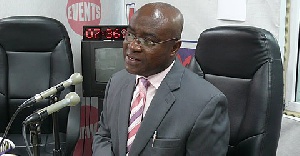Ghana’s “abysmal” performance in the past few years as far as GDP rate is concerned is what is holding back the West African Monetary Zone (WAMZ) from achieving its aim of having a common currency–Eco–the Minority in Parliament has said.
WAMZ history
The Heads of State of six countries in West Africa, as part of the fast-track approach to integration, decided in Accra, Ghana, April 20, 2000 to establish a second monetary zone to be known as the West African Monetary Zone by the year 2003.
These countries, namely The Gambia, Ghana, Guinea, Liberia, Nigeria and Sierra Leone, signed the ‘Accra Declaration’ which defined the objectives of the Zone as well as, an action plan and institutional arrangements to ensure the speedy implementation of their decision. It is envisaged that this Zone will be merged with the West African Economic and Monetary Union (WAEMU) to form a single monetary zone in West Africa.
At the second summit of Heads of State and Government of the Zone held in Bamako, Mali, in December 15, 2000 a number of important documents relating to the institutional, administrative and legal framework for establishing the Zone was adopted by five countries namely the Gambia, Ghana, Guinea, Nigeria and Sierra Leone, as follows:
- the Agreement of the West African Monetary Zone (WAMZ);
- the Statute of the West African Monetary Institute (WAMI);
- the Statute of the West African Central Bank (WACB); and
- the Provisions on the Stabilisation and Cooperation Fund (SCF);
Liberia, which was on observer status for about a decade, acceded fully to the WAMZ in February 2010.
The initial date for the launch of the single currency was January 1, 2003 but this was postponed to July 1, 2005 due to Member States’ inability to comply with all the four primary criteria simultaneously and on sustainable basis. The Zone witnessed two further postponements of the launch dates in 2005 and on December 1, 2009. The new date for the launch of the single currency was supposed to be on or before January 1, 2015, but like all the previous deadlines that has also been missed.
Minority blames Government for holding WAMZ back
At the presentation of its version of the state of the nation address Monday, Minority Leader Osei Kyei Mensah Bonsu said: “The economic growth in countries in the West African Monetary Zone averaged 6.7% in 2013.”
“Apart from Nigeria, the other countries, not counting Ghana, are non-oil producing.
“Ghana’s non-oil sector growth in 2013 fell below the countries in the sub-region, including such countries emerging from war situations as Liberia and Sierra Leone.
“In 2014 the average GDP growth in the WAMZ was provisionally stated as 6.2%. Ghana’s GDP growth, oil-included, was 4.2% and the non-oil sector grew at 3.8% (likely to be reviewed downwards to 3.5%).
“So Ghana was the country that was pulling the average GDP in the WAMZ growth downwards! Mr. President that is the plain truth that you did not tell Ghanaians,” the Suame MP said.
He said: “At the close of 2013, Ghana was the only country out of the 6 WAMZ countries that had failed to attain even one of the 10 convergence criteria.”
“For the second year in succession in 2014, Ghana scored zero out of the 10 convergence criteria involving 4 primary and 6 secondary criteria. Mr. President, this abysmal performance has not been seen for over 22 years! That is the true state of Ghana’s economy,” the Minority asserted.
General News of Tuesday, 10 March 2015
Source: starrfmonline.com
Ghana's
Entertainment
















